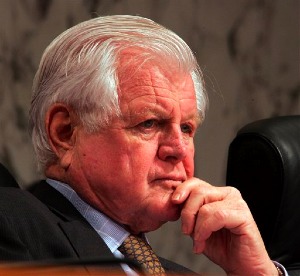Ted Kennedy, most influential minority party Senator ever
Pundits and other media commentators tend to emphasize the “art” of politics and the importance of personality when

Senator Edward Kennedy
they weigh in about important events in American politics. Yesterday, during the televised memorial for Senator Edward Kennedy, Joe Biden claimed that their colleagues often compromised with the Massachusetts Democrat because they didn’t want to look small or petty in front of him. Other speakers at the ceremony mentioned Kennedy’s personal warmth, tireless work, and commitment to social justice as reasons for his legislative impact.
There is some truth, I’m sure, to all of this. But scholars of the Senate – and hopefully the students that we teach in our classes – should recognize that effective legislating is about more than personalities, and that the lawmaking process is not just an art that defies systematic analysis.
I’m not arguing that Senator Kennedy’s progressive agenda was always best for the nation. Intelligent people will disagree about the value of what he accomplished, depending on their ideological preferences. But if you look closely at the long list of legislative achievements currently posted on the late Senator’s website, it is instructive that most of his biggest victories occurred when he and his fellow Democrats were in the minority, as they were during 1981-88, early 2001, and 2003-06. The reauthorization of the voting rights act, SCHIP, increases in the minimum wage, health insurance portability – these and most of Kennedy’s other landmark achievements took place when Republicans had formal control within the Senate chamber.
Senate rules, you see, provide all members, including members of the minority party, with the procedural tools necessary to force roll call votes on their issues. Unlike the House, there is no general “germaneness” requirement in Senate rules, meaning that Senators can offer amendments on just about any topic they want to just about any bill that gets considered on the floor. Among other talents, when Ted Kennedy was in the minority, he was the king of the nongermane amendment, forcing the GOP-controlled chamber to cast difficult roll call votes on labor, health care, and other initiatives that he championed. And he carefully tailored his amendments so that often he was able to pull over enough Republicans from moderate states to carry the day.
Moreover, when Ted Kennedy was in the minority, there were fewer alternative Democratic power centers in the Senate and he really stood out from the crowd. When Democrats control the chamber, as they do now, all of the committee and subcommittee chairs are from the party and most if not all Democratic Senators have the staff and agenda prerogatives necessary to make a difference. On the other hand, when Democrats were the minority party during Kennedy’s long tenure, the average Democratic Senator had far fewer legislative resources and lacked the power to schedule committee meetings. Ted Kennedy, because of his national prominence and stature as a liberal icon, really didn’t need a chair’s gavel to mobilize interest groups and secure media coverage.
So, when his party was in the minority within the Senate, Kennedy would quickly emerge, perhaps with one or two top party leaders such as Robert C. Byrd or Tom Daschle, as the most visible and influential of Senate Democrats. That stature, along with the freewheeling rules of the Senate, meant that Kennedy’s role was particularly pivotal when the other party had formal control of the chamber.
During one of the many televised interviews in the days following Kennedy’s death, his close friend Orrin Hatch, a conservative Republican from Utah, underscored my point. Back in 1981, Republicans became the Senate majority and Hatch chaired the important committee on Labor and Human Resources. Kennedy was the ranking minority member, or formal leader of the Democrats on the panel. You can imagine what it must have been like for Hatch, then a Senator for only four years, to look across the committee dais and confront the most famous liberal face in American politics.
Asked how his warm friendship and history of legislative collaborations with Kennedy began, Hatch responded that it all grew out of his experience working with him on the Labor Committee during the early 1980s. Kennedy, Hatch recalled, was remarkably adept at convincing moderate Republicans on the panel such as Lowell Weicker of Connecticut and Robert Stafford of Vermont to support his amendments during committee deliberations. Indeed, Kennedy often tied Chairman Hatch in knots, forcing the Utah conservative to deal with him and his health, education, and labor initiatives. Their personal relationship, in other words, was rooted in the procedural and political context of the Senate and Ted Kennedy’s remarkable ability to be a force in a chamber controlled by the other party.
My main point, I guess, is that pundits and media observers tend to overemphasize the personal and underestimate the systematic when they comment on politicians and policy making. Scholars and teachers, in contrast, focus more on context and what is predictable in the political world. The coverage of Senator Kennedy’s legacy that followed his death really highlighted these alternative perspectives for me.
Partisan and ideological differences aside, most of us will agree that Edward Kennedy was a remarkable legislative force on Capitol Hill for many decades. But as I try to emphasize to my students, even this singular individual, with his unique background and family legacy, operated within an institutional context that structured when and how he could exert influence. As a eulogy, this may lack eloquence, but in my view it is accurate nonetheless: “Ted Kennedy, the most influential minority party Senator ever.”



No comments.
Comments are currently closed. Comments are closed on all posts older than one year, and for those in our archive.